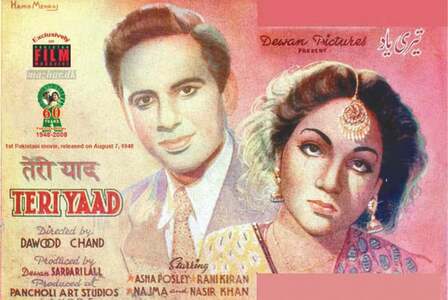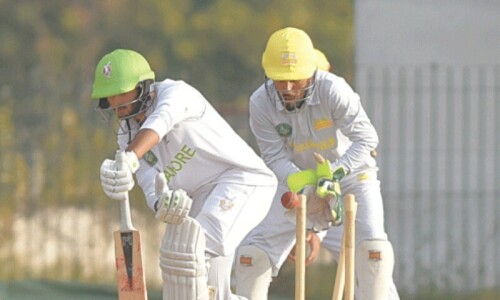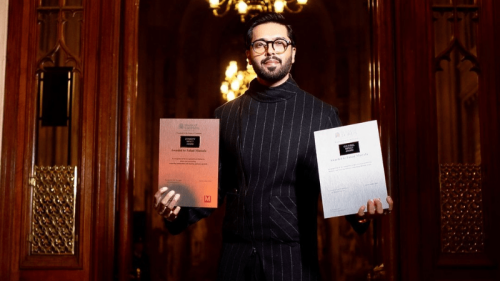
When a brief news item heralding the first-ever edition of the three-day Peshawar Literature Festival (PLF) flashed out over different media outlets, it created quite a stir among Peshawarites, and elsewhere in Pakistan’s northernmost province of Khyber Pakhtunkhwa (KP).
A group of educational and social institutes comprising the non-profit Dosti Welfare Organisation (DWO) and the University of Peshawar’s Institute of Education and Research (IER), Community Service Programme and History department joined hands to launch the much-awaited event in a city that has long been plagued by numerous unpleasant incidents.
The PLF’s inaugural edition ran from May 24 to May 26 at the IER’s premises and included 50 lively panel discussions, 150 talks with authors and 20 book launches. Initially, the sessions were fewer, but changes were later made to accommodate more local authors and books. Additionally, books, paintings and calligraphic art were available to buy.
A most engaging element was the 250-foot-long boundary wall opposite the event’s venue. This had been allotted the role of a ‘chalkboard’ and youngsters in attendance were encouraged to write on it with white chalk to share their thoughts — and vent their feelings.
The first Peshawar Literature Festival proved to be a milestone in the revival of Khyber Pakhtunkhwa’s literary, artistic and cultural activities
Participants arrived from various districts of KP, Karachi, Lahore and Islamabad and, anticipating a never-before experience, large numbers of students, teachers, the literati, academics and artists turned up, despite the extreme heat of the summer sun.
It was noted that — because of better mobilisation of women’s organisations in and around Peshawar — the number of women in attendance was significant.
The enthusiasm that went into managing the event was a pleasure to witness. Around 100 university students, both male and female, assisted in the proceedings.
Visitors from KP’s tribal districts thronged the venue and, as representatives of the Peshawar-based publishers Dust on Books noted, these out-of-city attendees showed an encouraging proclivity towards buying books.
The main objective of PLF 2022 was to explore the history, literature, culture and heritage of the Khyber Pakhtunkhwa province through a contemporary lens. The event served as a long-due moment of respite and — with their minds free of the fear of terrorism — attendees asked piercing and discerning questions of the writers, research scholars and rights activists taking the stage.
The spirited and stimulating panel discussions covered a wide range of topics, including the preservation of the Gandhara civilisation’s remains, the art of storytelling, public transport, rights of the transgender community, journalism, women’s education, Pashto folklore, religious affairs and development in the tribal areas.
During the session ‘Empowering Women in Khyber Pakhtunkhwa’, Kalsoom Zeb — novelist, short story writer and chief of the Peshawar-based women’s literary organisation Khwendy Adabi Lakhkar (KHAL) — pointed out that the portrayal of Pakhtun women in folk literature was dismal, as most literary pieces had been created by men.
However, towards the dawn of the 20th century, women writers stood up, figurative mirrors in hand, to portray the true face of the male-dominated society in Pakistan’s north. Exposing clichés and taboos, eminent Pashto women writers such as Zaitoon Bano and Alif Jana Khattaka laid down the foundations for the emancipation of Pakhtun women, marking the first successful attempts towards women’s intellectual empowerment in the region.
Zeb pointed out that women writers had boldly highlighted multiple issues, including sexual harassment and transgender rights. She added that the battle was still in progress and Pakhtun women still had a long, thorny path to tread. Stressing that the media needed to play its due role, she stated, “Our social fabric needs urgent reconstruction when it comes to women’s rights, whether about her public life, access to education or jobs and her role in decision-making.”
In the session ‘Pashto Novel in [the] 21st Century’, noted Pashto literature critic Dr Samiuddin Arman opined that poets and writers affiliated with the Khudai Khidmatgaar movement, initiated by Bacha Khan in 1929, had triggered political consciousness among the masses and also sparked a movement of creative writing in both fiction and non-fiction.
The session ‘Challenges and Opportunities of the Literary Industry’, debated KP’s linguistic diversity. Experts pointed to this acknowledgement of diversity as a great change agent, which could lead to the development of peace, and consequently tourism, in the region.
Most scholars and literati at the PLF were in agreement on the point that the tragic incident of 9/11 had made a huge impact on every aspect of global life, including history, literature, feminism, gender equality and socio-economic conditions, and KP had remained no exception. Literature created in the Pashto and Urdu languages in the region post-9/11 exhibited new dimensions in terms of fiction and poetry.
Panel participants openly condemned terrorism and militancy in any and all of its manifestations. They maintained that it was imperative for scholars and the academia to take fresh stock of the situation and develop new strategies to cope with militancy’s perplexing after-effects on the social and political fabric.
Respected intellectuals Dr Syed Munir Ahmad, Dr Noreen Naseer, Dr Bushra Rahim, Professor Fazal Rahim Marwat and Dr Zubaida Yousaf shared valuable thoughts on a variety of subjects.
Many panellists, irrespective of the core topic of discussion, underscored the need to revive the culture of social cohesion and mutual respect. They called for the preservation of the heterogeneous culture of the province, which has been rent by militancy and extremism for the last three decades. Almost unanimous was their praise for the contributions of local writers, linguists, artists and historians, and they exhorted the new generation of aspirants to follow in the footprints of their predecessors.
University student Rabina Saeed shared her views of the PLF experience with me, saying that she and her colleagues had amassed a wealth of valuable information on archaeology, history, culture and several issues — both old and contemporary. “We wish PLF becomes a regular feature, because young students can gain so much from a grand event such as this.”
On the festival’s concluding day, panellists vowed to keep advocating for the promotion of dialogue among communities to establish a more cohesive society. They said the PLF’s main objective was to bring the myriad issues affecting the people’s wellbeing to light, analysed through a rapidly emerging global lens.
Notable speakers on the third day were Dr Sayed Wiqar Ali Shah, Dr Faizullah Jan, Qamar Naseem, Prof Noorul Amin Yousafzai, Kalsoom Zeb, Dr Syed Irfan Ashraf, Dr Nidaullah Sehrai, Syedul Amin Ahsan Kheshgi, Farhad Muhammad Ghalib Tareen and Dr Anwar Ali Orakzai.
PLF 2022 proved to be a milestone in the revival of KP’s literary, artistic and cultural activities. But being the ‘first’ event of its kind in the city, some shortfalls were also noted. Although recitation sessions of poetry in Pashto, Urdu and English had the audience enthralled, no performances of local music, or drama/ theatrical enterprise, were staged.
Neither was any musician or performance artist invited to make a presentation on the plight of artists. This was curious, since musicians, actors and others associated with the performing arts have been the greatest victims of terrorism.
That being said, one hopes that the first PLF paves the way for more vibrant and comprehensive festivals in the years to come.
The writer is a Peshawar-based contributor on Pashto literature and culture. He tweets @Shinwari_9
Published in Dawn, Books & Authors, June 5th, 2022















































Dear visitor, the comments section is undergoing an overhaul and will return soon.